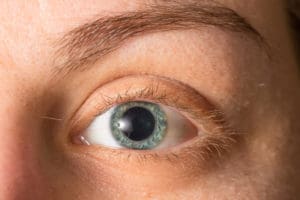Stress & Your Vision: What Recent Research Shows
Home / Vision Education Center /
Last Updated:
Researchers have found that mental stress can lead to symptoms of vision loss and vice versa. Interrupting the cycle of stress and vision loss is imperative to addressing stress-related vision problems.
Table of Contents
The effects of stress on your vision can range from eye strain to double vision to visual distortion. The symptoms can appear in a variety of ways, such as only affecting one eye, switching from eye to eye, being present constantly, or coming and going.
Stress causes vision problems by activating the body’s fight-or-flight system and by releasing the stress hormone, cortisol. Excess amounts of adrenaline and cortisol can lead to eye and brain problems that affect your vision.

All types of mental stress can cause vision problems. Chronic stress, as well as anxiety and individual highly stressful situations, can cause increases in adrenaline and cortisol that result in vision problems.
Recent studies investigating the connection between stress and vision problems have also identified effective treatment approaches. Taking a psychosomatic approach by emphasizing stress reduction and relaxation techniques is a highly effective approach to treating stress-related vision loss.
The latest research on vision problems caused by stress focuses on reducing your stress, whether you are in an active stress response or if stress is part of your daily life. In combination with traditional vision problem treatments, reducing stress can help you feel better mentally and physically on a daily basis.
Stress & Vision Loss
Recent studies have identified a connection between stress and vision loss. Stress can cause vision loss and be a result of it. Because of this connection, eye care providers are encouraged to avoid performing unnecessary tests on their patients and even focus on reducing stress as a cure for some vision loss.
Types of mental stress that can be caused by vision loss include the following:
You deserve clear vision. We can help.
With 135+ locations and over 2.5 million procedures performed, our board-certified eye surgeons deliver results you can trust. Your journey to better vision starts here.
- Anxiety
- Depression
- Social isolation
- Worry
- Fear
According to one recent study presented by the European Association for Predictive, Preventive and Personalized Medicine (EPMA), prolonged mental stress can make vision loss worse. Continuous stress in the body causes cortisol levels to rise, which in turn negatively affects the eyes and brain.
Imbalances in the sympathetic nervous system caused by this increase in cortisol can lead to diseases of the visual system, such as glaucoma and optic neuropathy. Because stress is both a consequence and a cause of vision loss, people can find themselves in a dangerous downward spiral. That is, initial vision loss causes stress, which in turn leads to more vision loss, lending to once again increased stress levels and so on.
Effects of Stress on Vision
There is a clear connection between stress and its effects on vision. Anxiety alone can cause many different eye and vision symptoms to develop.

Common vision symptoms of stress include:
- Seeing stars, shimmers, blurs, halos, or shadows.
- Fogginess.
- Flashes of light.
- Double vision.
- Narrowed vision or tunnel vision.
- Feeling of surreal or dream-like vision.
- Momentarily brightened or dimmed vision.
- Visual distortions.
- Kaleidoscope vision.
- Unusual pulsing.
- Eye strain.
- Sore eye muscles.
Someone who is having vision symptoms caused by stress and anxiety may experience them in many different ways. Stress-related vision symptoms may:
- Affect one eye only.
- Shift back and forth between eyes.
- Affect both eyes repeatedly.
- Come and go.
- Occur frequently.
- Occur occasionally.
- Occur all the time.
- Increase in response to stress.
- Precede anxiety or stress-related attacks.
- Occur randomly.
How Does Stress Cause Vision Problems?
Stress causes vision problems by activating your stress response, or your sympathetic nervous system’s fight-or-flight response. Chronic stress and anxiety cause elevated levels of adrenaline to stay in your body. This adrenaline can then cause pressure to build up in the back of the eye and lead to symptoms of blurred or tunnel vision.
Along with increased levels of adrenaline, increased levels of cortisol have been linked to stress-related vision problems. Cortisol, also known as the “stress hormone,” is released by the body in response to stress and impacts blood pressure, respiration, and muscle tension. When too much cortisol is released, it can disrupt blood flow between the eyes and the brain, leading to vision problems.

Additional effects of the stress response on vision include:
- Dilation of pupils.
- Narrowing field of vision.
- Reduced blink rate.
- Tensing and increasing of blood flow to eye muscles.
- Dry eyes or very wet eyes.
People with long-term stress and anxiety also report experiencing eye strain throughout the day. Stress that causes hypervigilance, as it relates to vision, causes pupils to dilate and makes the eyes highly sensitive to movements and your surroundings. This prolonged elevated sensitivity can lead to eye muscle tension and headaches.
You deserve clear vision. We can help.
With 135+ locations and over 2.5 million procedures performed, our board-certified eye surgeons deliver results you can trust. Your journey to better vision starts here.
Types of Stress That Cause Vision Problems
Many different types of stress can lead to vision problems. Connections have been made between vision symptoms and the following conditions:
- Anxiety
- Chronic stress (hyperstimulation)
- General stress
- Severe stress
- Conversion disorder (due to repressed emotions)
- Emotional exhaustion
Typically, once the causes of your stress are treated and stress is relieved, so are the symptoms of stress-related vision loss. If you experience symptoms of stress-related vision loss and do not have any other medical conditions or symptoms, addressing whatever type of stress you have will help the body calm down and deactivate its stress response.
Best Treatment Options
For people experiencing complications from stress and vision loss, the researchers from EPMA encourage a psychosomatic approach to treatment. In addition to traditional vision treatment options, an emphasis should be made on utilizing stress reduction and relaxation techniques. Such techniques include the following:

- Meditation
- Yoga
- Autogenic training (teaching the body to respond to verbal commands to relax)
- Stress management techniques
- Breathwork
- Therapy
- Social support
Incorporating the above techniques into your vision loss treatment plan may be more than complementary. They could also help to prevent and reduce the progression of vision loss.
Additionally, eye doctors should work with patients to reduce stress surrounding their vision problems and instead encourage optimism about the patient’s ability to take an active role in their own visual health.
Reduce Your Stress
The key to treating vision symptoms caused by stress is to reduce your exposure to stress. If you are experiencing an active stress response, take measures to calm yourself down and let your body recover from the surge of adrenaline. Within 20 minutes or so, your body should recover and your vision should return to normal.
If your vision problems are caused by chronic stress, it is important to make changes to your daily life and incorporate stress reduction techniques that will free you from the negative impacts of constant hyperstimulation. In addition to utilizing stress reduction techniques, try not to focus on your symptoms. Sleep more, eat a healthy diet and exercise regularly. These can all help to lessen the negative impacts of chronic stress on your vision and overall health.
You deserve clear vision. We can help.
With 135+ locations and over 2.5 million procedures performed, our board-certified eye surgeons deliver results you can trust. Your journey to better vision starts here.
References
- Anxiety and Vision Problems. (November 2018). Health Central.
- Can Stress Cause Vision Problems? (September 2018). The Optometry Center for Vision Therapy.
- Eye Problems: Vision Anxiety Symptoms. (November 2019). AnxietyCentre.
- Mental Stress as Consequence and Cause of Vision Loss: The Dawn of Psychosomatic Ophthalmology for Preventive and Personalized Medicine. (May 2018). European Association for Predictive, Preventive and Personalized Medicine Journal.
- Persistent Stress May Lead to Vision Loss, Study Shows. (June 2018). Medical News Today.
This content is for informational purposes only. It may have been reviewed by a licensed physician, but is not intended to serve as a substitute for professional medical advice. Always consult your healthcare provider with any health concerns. For more, read our Privacy Policy and Editorial Policy.